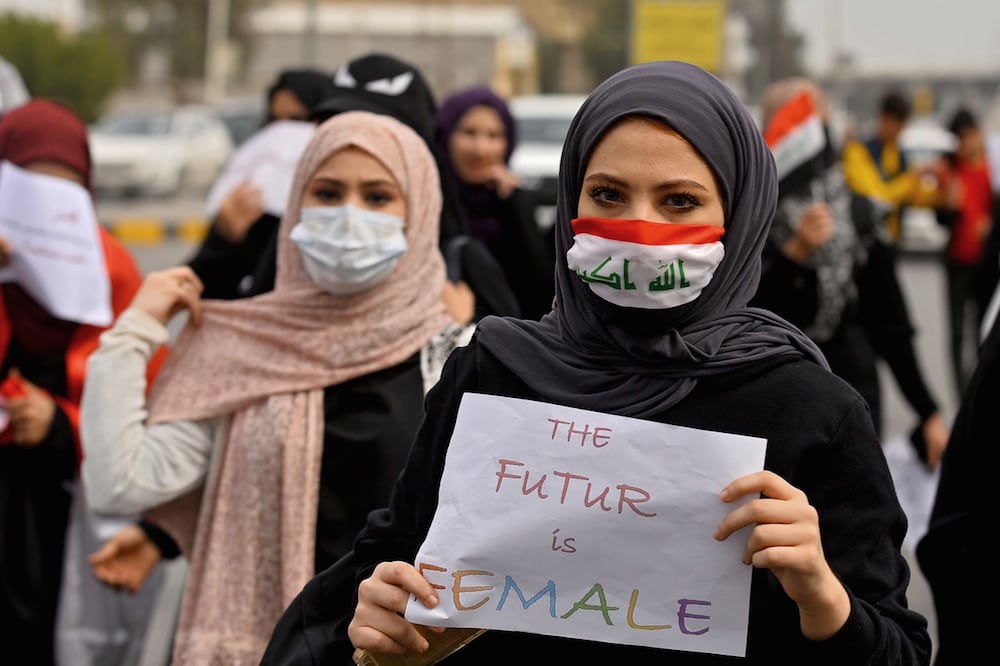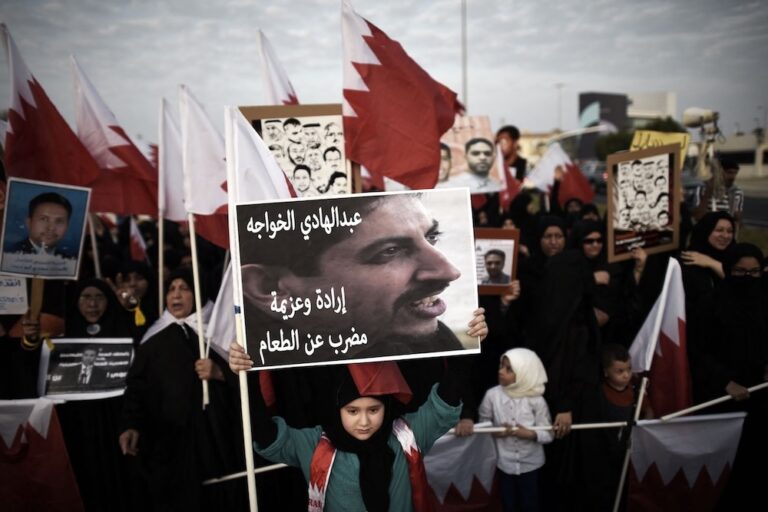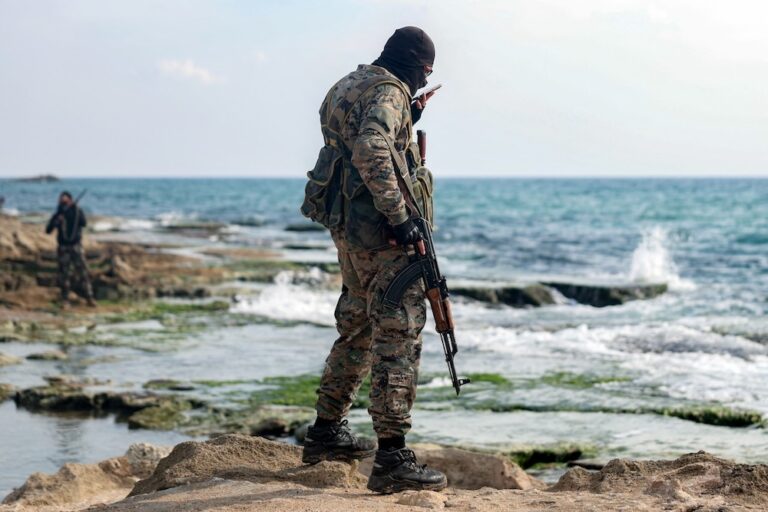In his contribution to IFEX’s series marking International Women’s Day, Regional Editor Naseem Tarawnah paints a disturbing picture of the rise in digital attacks and the direct connection between online and offline violence against women in the region.
As social media access increases in the MENA region, women are facing severe repercussions for their online free expression. Recent years have seen offline patriarchal authority extend its reach online, harnessing the digital space to create a hostile environment for women.
From increased sexual harassment and online gender-based violence, to hacking, privacy violations and online smear campaigns, women in the region face a plethora of digital methods that undercut their free expression, and more often than not, yield real-world consequences.
The fact that women activists and human rights defenders are particular targets, with social media platforms used to publicly smear and shame them in a male-dominated society, has undoubtedly had an impact on shaping how everyday women use these platforms for free expression.
Reporters Without Borders recently reported on such a story in Syria, involving Merna Alhasan, a freelance journalist who is one of the first women in the region to acquire a significant media profile as a result of her coverage of the situation in the Idlib region: “Look what happens to someone who betrays her country,’ was the response repeated on dozens of pro-government social media accounts earlier this week, including a member of the Syrian Parliament, when it was reported that she had been raped by terrorists and left for dead. Denying the report on Facebook, Alhasan responded: ‘Every day a new rumour! I’m fine, thanks.”
In Saudi Arabia , prominent women’s rights activists faced an online campaign labeling them as “Agents of Embassies,” days after their imprisonment.
Although online harassment is nothing new to the region, it is essential to understand how it is shaping women’s freedom of expression, especially those who are active in the public sphere, such as activists and journalists, and identify how such digital threats are currently manifesting and evolving.
Iraq: Sextortion and smear campaigns
In 2018, long before ongoing anti-government protesters called for an upheaval of the political system, Iraq’s approaching parliamentary elections were seeing a surge in women candidates. Supported by a women’s quota in a bid to increase representation, over 2,600 women competed during the election season for a place in the 329-seat Council of Representatives. Their campaign posters lined the streets alongside their male counterparts, offering a stark contrast in a male-dominated arena and conservative society.
The backlash was swift. In the streets, posters of women were torn or defaced, but online, the damage was darker.
One candidate, Dr. Intidhar Jassim, was forced to withdraw after a sex tape of an alleged affair circulated online. An economics professor, wife and mother of three, Dr. Jassim took to Facebook to defend herself. “I am sad for a great nation that believes the rotten fabrications of politicians who target the honor of others and publishes fabricated clips,” she wrote. “Everyone knows my family and knows my husband Dr. Sa’ad Salih al-Hamdani…I am the daughter of your country. I implore you do not listen to rumors,” reminding her followers of her tenure as a professor, and her family’s entrenched roots in the community.
Hours later, Dr. Jassim resigned.
Unfortunately, she was not alone. One female candidate saw her phone stolen, and photos of her wearing a short skirt at a private event were circulated online. The surge of defamation campaigns targeting women candidates during the elections compelled the UN to issue a statement after meeting with several of the candidates.
In Iraq and throughout much of the region, sextortion – the sharing of private photos or videos without consent – looks to specifically target women’s morality and comes with real-life consequences in a largely conservative region under patriarchal rule. For their free expression women are faced with a myriad of dangerous outcomes that range from being disowned by their family and shunned by society to becoming targets of radicals and honour killings.
In September 2018, Tara Fares, a 22-year-old Iraqi model and Instagram influencer, was shot and killed by unknown gunmen while she was driving in Baghdad. Fares, who at the time of her death had over two million Instagram followers, reportedly received online threats and insults that accused her of posting indecent content. Two days following the murder, former Miss Iraq Shimaa Qasim took to social media to inform her own millions of followers that she had received threatening texts warning her that she would be next.
This increasingly hostile environment extends beyond individual cases, and can play out en masse. Since assuming prominent participatory and leadership roles in recent anti-government protests, young Iraqi women have become targets for similar attacks.
Women protesters have reported a systematic campaign of defamation, incitement and doxing on social media that targets feminist leaders in the protest movement. Facebook has become one the most utilized tools to discredit and crack down on women activists, with pages circulating photos of women protesters, and lodging fabricated charges against them ranging from immorality and indecency to being funded by international organizations.
In February 2020, Iraqi cleric Moqtada Sadr tweeted an 18-point code of conduct for protests, accusing the largely student-led anti-government protesters of promiscuity, and called for gender segregation.
Seen as a bid to silence women, Sadr was heavily mocked online, and hundreds of Iraqi women donned pink scarves and marched across the country days later. Defying his call, the women marchers sent a clear message: they would not be swayed from participation in the protests or have their role in the country’s social fabric be diminished by outdated traditions.
Palestine: Self-censorship and violent consequences
For Palestinian women, online harassment has created a burgeoning climate of self-censorship. Take for instance 21-year old Israa Ghrayeb, who posted a selfie video of herself with her soon-to-be fiancé during a chaperoned date. When the video was shared with her family, they reportedly beat her so severely that she fell from the second floor balcony of the family home. She was later beaten to death while recovering in the hospital, and could be heard screaming during the attack in footage circulated online.
The tragedy sent shockwaves throughout Palestinian society, and among women in particular. In the immediate aftermath, Ghrayeb’s death inspired both online solidarity in the form of the #WeAreIsraaGhrayeb hashtag, and a women’s protest calling for tougher legal protections.
However, the long term ramifications center on how this case, and many like it, serve to augment a sense of fear amongst women about the potential consequences of free expression.
Without the proper legal protections, women are left to deal with the consequences alone. Many resort to self-censorship as the safest recourse. In a report published by IFEX member The Arab Center for the Advancement of Social Media (7amleh), one-third of surveyed young women said they had been subjected to violence and harassment online, including hacked accounts, extortion, publishing personal details, and receiving inappropriate pictures or content.
In response to the attacks, one in four women surveyed in 7amleh’s study said they closed their social media accounts and withdrew from the Internet, and 42.9% said they actively engage in self-censorship.
As the report aptly notes, with increased access to social media Palestinian women are still subjected to patriarchal authority online, which ultimately “limits their freedom and shapes how they interact online”.
While there is a tragic irony in women self-censoring or even giving up the very platforms needed to challenge the societal norms that curtail their free expression, the caution is understandable, given the dangers they face.
The future is unreal
Short of a complete dismantling of the patriarchal frameworks governing societies in the region, the future of women and their online free expression is concerning, to say the least. Governments have been slow to develop the necessary laws to criminalise online harassment, and authorities are hindered from investigating or providing protection.
Awareness campaigns attempting to mitigate the problem of sexual harassment and violence online have been rightly criticised by IFEX member SMEX, among others, for being designed within a patriarchal framework that places responsibility solely on the victims rather than the harassers.
In the meantime, new tools and technologies that can be wielded to maliciously target women are evolving at a breakneck speed. Deep machine learning and artificial intelligence are creating new digital threats, including the rise of deepfake technology – the manipulation of video and text to produce fake content that looks increasingly authentic.
Deepfakes have evolved in both capacity and volume, with deepfake videos in particular doubling in a single year. While much of the usage has centered on producing pornographic content and political disinformation, it is not difficult to imagine the technology being used for online gender-based targeting, especially in the MENA region.
According to the Gulf Center for Human Rights, women human rights defenders in the region could see deepfakes exploited to fuel defamation and smear campaigns, and encourage systematic stigmatisation attacks, putting them at increased risk for their activism.
Where the fight is
Social media platforms have created new avenues for women to push back, and recent years have seen numerous campaigns across the region that aim to raise awareness. Anti-harassment hashtags like #NotYourHabibti in Palestine, #EnaZeda (me too) in Tunisia, #MeshAyb (no shame) in Lebanon, and the regional #AnaKaman (#MeToo) and #Ismaani (#HearMeToo) have proliferated. While some dismiss hashtag campaigns as ineffective, they do help create a crucial space for an unprecedented collective conversation to take place, and encourage a growing number of women to share their experiences and build community solidarity.
In the uphill battle for online freedom of expression in the region, women, especially those on the activism frontlines, will undoubtedly need to arm themselves with the tools and know-how to identify threats and safeguard themselves and their peers to mitigate the risks. Fortunately, organisations in the region like SMEX and 7amleh have aided in the cause, with their work producing indispensable resources for the community.
Editor’s note: The quote from Dr. Intidhar Jassim originally included was not the correct quote; it has been corrected above.



